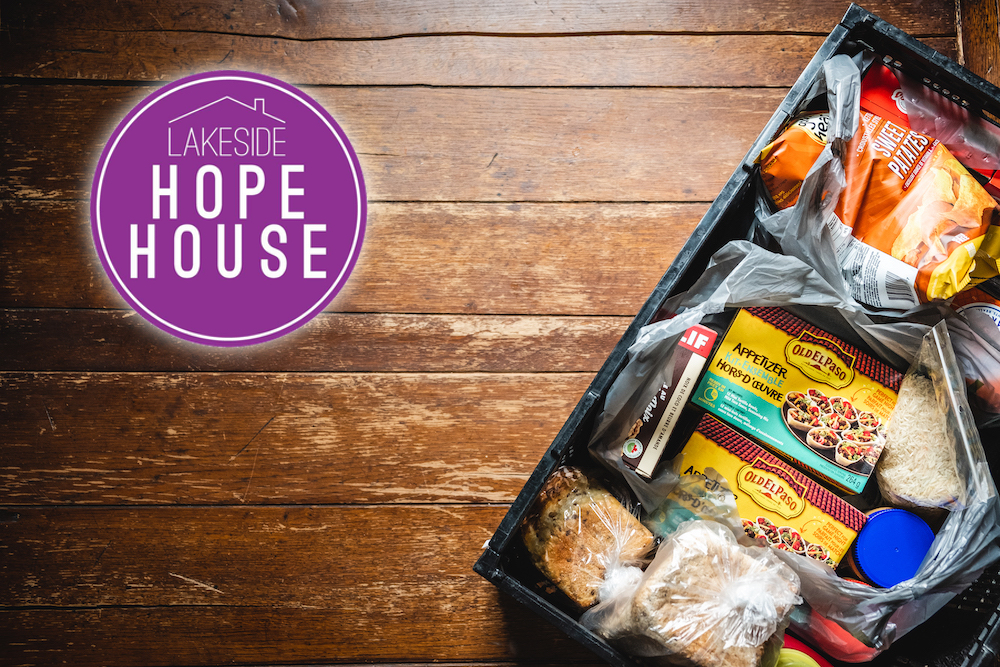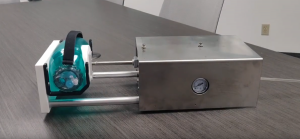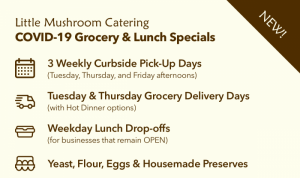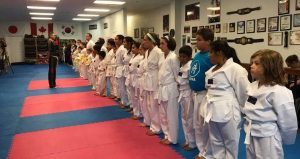00:45 – A background about HOPE House, their focus, and programs
03:17 – How the opposite of poverty is community
05:43 – The Linamar delivery system
07:10 – Programs put on hold and finding solutions through organization partnerships
09:07 – The potential for long-term post-Covid partnerships
10:32 – Looking back on initiatives to change/keep going forward
11:39 – How being in a position to take responsible risks can lead to innovation for all
14:08 – Why helping your neighbours helps HOPE House
15:01 – Volunteer opportunities
15:29 – On the need for taking care of yourself
Click the “Connect” tab to browse web/social links …
Website: lakesidehopehouse.ca
Facebook: @LakesideHOPEHouse
Instagram: @lakeside_hope_house
Twitter: @lakesidehh
YouTube: Hope House
LinkedIn: @lakeside-hope-house
Transcript
Jason Bavington (00:02):
Hey everyone, it’s Jason with DUX — Your Local City Guide. And we’re here for another fantastic episode of our video blog, which is just a ton of fun to film these things. Learning a lot about great businesses and great organizations in the community that are doing some fantastic work to help everyone through our current Covid crisis. And today on the call we have Jaya James who is the executive director of HOPE House. Welcome Jaya!
Jaya James (00:27):
Thank you for having me.
Jason Bavington (00:29):
I know our connection is not, you know, the best of connections today, but you know, we’ll just keep going through it. At least we have the name to the face and we have the audio, we have some video and so it’s all good. I’m good with that
Jaya James (00:42):
For sure.
Jason Bavington (00:44):
So yeah for those of us that aren’t familiar with HOPE house, do you want to just tell us a little bit about what hope house is, what your organization normally does outside of Covid? Yeah, just a little bit more about what you guys are all about.
Jaya James (00:58):
So HOPE house is a poverty relief agency in the City of Guelph. We’ve been here since 2012. We really focus on the idea that the opposite of poverty is community and that poverty is more than just limited financial resources. But it also are things like limited, emotional, relational, spiritual from a sense of purpose and meaning in one’s life and physical resources in our lives. And so we work with community members, individuals within the community that are struggling or have shortfalls as any of those areas and help support them by bringing a community around them to address those issues and help them build capacity. So before Covid-19 we kind of, our programming was grouped into three categories, immediate relief program. That was like our food market, which is all based on being able to choose the items that you want. Clothing market where, again, you got to choose the items that you want. A hair salon, meal programs and a horticultural therapy program in partnership with the Julian Project out at Ignatius in Guelph.
Jaya James (02:04):
And then we had our ongoing support programs, which were all about building life skills or supporting healthy lifestyles. So it included things like circles, which really works on helping to build the capacity of individuals to exit poverty. It was programs such as our creative connections where people could do art and all sorts of other very creative art, music, needlework, which has been found to be very therapeutic and healing to individuals. And it involved other programming about system navigation or support and helping to find employment. So that’s kind of our ongoing support. And then we also had community projects, which are quite well-known through the community. So and these were done in partnership with other groups. So the Guelph community backpack project, which we do in partnership with the Guelph Neighborhood Support Coalition to help youth and children have access to the resources they need for school as well as our hope for the holidays, which provides a whole bunch of holiday planning things like meals and make your own gifts and celebratory events along with a Christmas hamper.
Jaya James (03:09):
that kind of we were doing as well. So these are examples of the work that we were doing before Covid 19. With the onset set of Covid 19, there’s been lots of changes, but as usual we’ve really seen it come to life. How the opposite of poverty is community and the community has really stepped forward to help with those changes. So the focus of our programming right now is on meeting the needs of food insecure households. We have moved our food market programming into home delivery. People now call, we still take their order because it’s really important to us that people get to choose what it is they’re getting for their food. And we know that that logistically makes things slower cause every order is a custom order. But we do think that’s essential to providing dignity to individuals.
Jaya James (03:58):
So we take the order, we pack the orders and Linamar has been delivering all the orders to the homes. In April we had 11, almost 1,100 people receive their food orders to deliver directly to their houses. We also have our tax clinic still running, so people can drop off their taxes and get those completed by a tax specialist who calls them on the phone and sets that up and get’s that done for them. And we have online and virtual counseling in partnership with Five Star Relationships. So that’s kind of how our programming has morphed over the last eight weeks. It’s been a real adventure and ride. It’s like going back to university right into a PhD program. But it’s been amazing to see how the community has come together and is stepping up and helping. So we’ve really felt well supported and every time we hit a hurdle, someone has always stepped forward to help.
Jason Bavington (04:51):
That’s great. And I, I really appreciate the little comments about the community because that’s what, just on a personal level, what I’ve noticed a lot is how the community in all ways and shapes and forms, even down to, you know, people saying more like saying hi more frequently on the street. Because we are all in this together, you know, no matter what, no matter our demographic, no matter where we are on the societal scale, this affects all of us in very different ways. And like you said, what we have at the end to come back to is that sense of community and that contribution and being part of that community, because that’s what gets everyone through everything at the end of the day, right? It’s all of us together. Working together. Whatever we can. And it’s great that you guys have been able to pivot, particularly with your food program, to be able to offer more custom orders while still having that program running and to have Linamar to come on board and help out with deliveries. That’s, that’s just amazing. Like how did that, how did that happen?
Jaya James (05:49):
Linamar actually approached us. It’s a prime example of how the community stepped forward. So around the end of March, they just said that they had some extra drivers because they were kind of winding down with the restrictions that the government was putting on. And so they said, you know, we’d like our drivers to be able to help out in our community. And so they approached a number of agencies. We were one of them and we said, yes, we’d love to have your help. Yes, please! Exactly. Yes please. And so they’ve been absolutely amazing because they know how to do deliveries. So we didn’t have to do really any training on that. I think they’ve done lots of training with us. Starting this wee, we’re going to route optimization. So we’re learning how to plot routes in ways so that they make logical sense and that’s a brand new thing for us. But it’s been really great having that support. And they’ll continue to support us until the end of May and then they’re getting their manufacturing back up and going, which is great because as the manufacturing and other jobs come online, that number of households that are food insecure also goes down. So we’re excited for them and really thankful for the support they’ve provided.
Jason Bavington (06:52):
So as the community shifts back to, you know, what will be a new normal and having those support measures in place that really helps. But knowing that bridging the gap, you guys are working together to make sure the food insecurity issue is addressed is really, really important and of course always appreciated. Are there any programs that you have not been able to continue for now or have had to put on hold for whatever reason?
Jaya James (07:15):
The programs that we really had to put on hold were our meal programs. So we partnered with Royal City Mission, the Drop-In Centre, and the Community Health Centre in Chalmers. And this was back in March 17th, I believe. And we basically said, we need to streamline what everyone is doing so that we can deliver the programs in the most effective way, but also the safest way. So for us that meant we put our meal programs on pause because the Royal City Mission agreed to do all the cooking for the meals and then they would do the delivery to the different sites that required the meals. So it was a great opportunity there for making sure that people were having access to the resources they needed, but at the same time making sure it was done in a safe way. So it’s moved away from meals being in a group setting to kind of more like a restaurant style, to meals being delivered to the home. So they have similarly done a very similar process to what we did. We switched our food market appointments to delivery and they switched the meal program to delivery and we’ve supported each other in getting that done.
Jason Bavington (08:21):
Yeah, again I do recall hearing about how the Drop-In Centre and ,you know, all of the organizations did get together to streamline that as you mention, and there’s power in numbers, right? So all these individual organizations trying to do their own thing collectively are that much stronger and then are able to more effectively fill that need and keep the programs going in the best way possible. You know, there can’t be any meals onsite, but yeah, delivery or just picking up the meals as well. Right? I believe that happens. As long as they continue and have found these creative means during these challenging times. The more people, you know, more people brainstorming, the greater the ideas become and the more powerful they become. So that’s really, really fantastic. Do you, do you foresee any new sort of long-term partnerships emerging out of Covid now that there’s been an opportunity? I know all the organizations typically work together in some way, shape, or form, but now that relationship has been strengthened. Do you see opportunities to, you know, continue to collaborate through other programs going forward that might not have happened in the past?
Jaya James (09:27):
Yeah, I do think that’s definitely an opportunity that’s available to us. And I think all the time when you have big shifts, it really forces you to look at how things are done. And this has been this really big disruption and shift. And so there’s lots of conversations going on. In fact, I’m going to one this afternoon that The SEED is leading, which is part of the Community Health Centre and looking at how can we look, how can we better maybe warehouse our items or do things together more. And so there’s the opportunity there and I’m hoping that we’ll be able to work through all that. Of course, every change requires figuring out lots of logistics and I’m very hopeful that we’re going to be able to find a new path forward that will result in a broader reach for programming across agencies so that we’re better serving our community. And it’s kind of, to me, that’s the exciting thing about all of this. The positive that can come out of these really challenging times is that it’s forced us to take some pretty big leaps and it’s given us a chance to see what can be accomplished when we make those big leaks.
Jason Bavington (10:32):
Yeah, for sure. Now that you’ve had an opportunity to work with these revised programs over the past eight weeks or so. Looking back, is there anything that HOPE house would change or do differently? You know, now that you had a chance to experience how the programs, the modified programs, have been working or have been received by the community?
Jaya James (10:51):
Yeah, so I think, the one thing, well there’s a couple of things. I think that the addition of online and phone counseling. I think even when we go back to having face-to-face counseling, we’ll definitely still keep those other options because they do work really well for some people. I think that, for our food market, we hope to continue to be able to provide, to have the home delivery for individuals who have accessibility issues. So, even though we won’t be able to provide it to all a hundred appointments that we have in a week, there is probably a 10 to 15 appointments a week that really do struggle to get out and that we will be able to now that we’ve been through this and have ideas on how to do it, hopefully we can maintain that.
Jaya James (11:31):
And I guess the real other thing is just kind of to that, keeping that open mind, being willing to always look at things differently. I think to me one of the exciting things about being in the charitable sector is that you have the opportunity to take risks that other groups don’t take. And I’m not saying like huge, you know, risk there, that there hasn’t been some calculation as to what’s involved and trying to mitigate risks. But there’s a chance to do things that are more challenging for government agencies or for profit businesses to do because of the fact that we’re always working on really tight budgets. And so there is this natural drive to be really inventive and I think that we can be the beta testers within our society, to kind of try out things because we can try them on the small scale and we can afford to learn the lessons in some ways of hard knocks.
Jaya James (12:22):
Learn the lessons that, “Oh, that didn’t work”, but because we’re doing everything on the small scale, the financial cost or the social costs can be quite low. But then we can keep adapting and changing and that can be more challenging for some of the for profit businesses and for government because they are doing things on such a large scale in general that to try to do a small thing is, it’s very disruptive to their processes and so it means that they have to have a longer runway in order to go through something to do a change. But when they do do it, it has the opportunity to have significant impact. And I think that, as a charity, what we can do is kind of do that piloting / beta testing for those organizations that can then give the ideas that can result in systematic change. And I think this is what we’re seeing right now is we’re seeing these organizations and nonprofits step forward and do that beta testing. And I think we’re starting to see with groups like the Community Health Centere, who are part of the government, starting to look at, “okay so what can we take from this and maybe do some more systematic change.”
Jason Bavington (13:24):
Yeah and maybe at the end of all this ’round’ there can be a debrief and there could be, if there’s something that doesn’t already exist like this, a “Charity Wiki” of new and innovative programs that everyone collaborates and contributes to that can then be, further to greater means and greater ends, as you said once it gets to the government level and can be deployed there. But yeah, having all these individual organizations trying all these new things. Like you said, I see a lot of flexibility with charities. Like you say, there’s a lot of, it’s easier to turn the boat and pivot the boat. So collaborating and consolidating all those experiences into some sort of reference going forward I think would be really, really powerful to develop future programs and future responses should something like this come along again. Is there anything that the community can do to assist HOPE house during this time? Do you need, do you have a page? Like people might want to volunteer their time or, you know, donate and make a donation. Is there someplace they can go to learn more about what you’re doing and help out if they are able to?
Jaya James (14:24):
Yeah, so I always say the best thing that the community can do is take care of their neighbours, friends and family. Cause, you know those people very closely. You have relationships with them, you have the ability to see where they’re struggling or where they have greater need. So if everyone can really focus on taking care of their neighbours, friends and family and helping connect them to organizations. If there’s supports that they need that you’re not able to provide or they’re not able to get access to, that will make for a healthier, kinder, more thriving community overall. So that’s to me the primary. Then the secondary thing is, you know, there’s always opportunities to volunteer at places like HOPE house. For us, there’s going to be, as we move into June, going to be some driving to get deliveries to homes as other agencies start to ramp back up as well as some opportunities to work out at our gardens.
Jaya James (15:17):
We have eight acres out at Ignatius that we’re getting ready to plant for crops for this year. And so there’s great opportunity to be physically distanced from each other while still working on a beautiful property. And, and then I kind of, I think the last thing is to take care of yourself. It would be, I’d say is kind of the message I say to our community is that, we’re now 49 days I think it is in. I have a friend who keeps a captain’s log and kind of runs it down. So I think we’re around 49 days, give or take. And you’ve had your world changed fairly radically. So be sure to show some self-compassion because it’s, it’s been a bit of a long haul and there’s still a lot of uncertainty. And so if you’re not doing well, then you’re not able to help support others.
Jaya James (16:05):
And so try to make sure that you’re doing something for yourself each day that fills your tank. And whether that’s, if you’re an extrovert, usually that’s being reaching out to someone and having a conversation or if you’re an introvert and maybe are stuck in a house with a lot of people, make sure you find that private space where you’re able to recharge your tank. Because we want to see you be healthy and I think that we right now are building a kinder, more generous, compassionate community. And I think that if we keep doing those things, taking care of our neighbours, friends and family, making sure that we kind of volunteer where we can volunteer and also making sure that we fill our tanks, that we’re going to have a way, like way stronger, more resilient community at the end of this, that’s not only thriving relationally but also would be thriving economically. Cause if we’re healthy emotionally and relationally, we are much more productive.
Jason Bavington (16:57):
Yeah, I totally agree. I think that is one of the, you know, benefits or outcomes that’s a positive outcome from this whole experience is that in some ways I feel like we’re raising the collective consciousness higher because we’ve been challenged in so many ways that we’d never been done before. And it kind of … what do you do in challenge? You get back to your roots and your roots is community, taking care of yourself, like you say, which I also agree is extremely important and I don’t think there’s enough attention put towards that idea or, you know, reinforcing that idea, taking care of yourself before you take care of someone else. I think it’s absolutely essential. I totally agree. And then taking care of, like you said, of your neighbors. I think that’s, that’s really great that you say, you know, well one of the best things that everyone can do who wants to support HOPE house is, you know, turn to your neighbours and make sure they’re okay.
Jason Bavington (17:40):
Yeah. Because we are all in this together, right? And then there’s a variety of other ways to help out through gardening and driving and things. Yeah, I totally agree. It’s actually quite exciting to see where we’re going to end up at the end of all of this. And I totally agree that I think it will be a more compassionate world where, you know, because we’re all in it together and we kind of, we kind of realized that, right? It kind of removed the whole silo effect of society. And kind of broke those walls down a bit and I think those walls will stay down, which, you know, will have all sorts of great benefits moving forward. So I’m Jason with DUX — Your Local City Guide. Jaya, thanks very much for being on the call today, Jaya, the Executive Director of Lakeside HOPE House. If you’re watching this anywhere else but on our website, head on over to dux.city.
Jason Bavington (18:27):
That’s d u x . city. Click on the blog link. You’ll find this post there about HOPE House and, Jaya, what we’ll do is we’re going to put all the web links and social, all those connections on our post on the page so people can click through and find out more about what you guys are doing, keep up to date, volunteer, et cetera, and just keep tabs on what you guys are doing. So thank you very much, Jaya. It was really a pleasure to chat with you today. It was a pleasure chatting with you, too. Everyone, take care and keep supporting your neighbours. Keep supporting yourself. And keep growing your community. And DUX — Local City Guide just wants to say, keep sharing and supporting your local goodness. Cheers.






